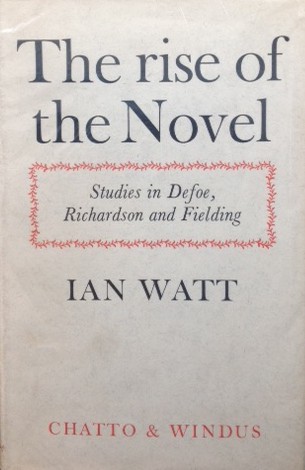Inspiring Older Readers
 posted on 21 Oct 2017
posted on 21 Oct 2017
The Rise of the Novel by Ian Watt
I have a very soft spot for Ian Watt’s ground-breaking study in literary criticism. I’m pretty sure that this was the first work of criticism that I was ever able to read from cover to cover and it was responsible for convincing me that books like this were not beyond my abilities – which until this point I suspected might be true. I can’t pretend that as a result I reach for the masterpieces of the literary criticism genre as a matter of course but they have often provided me with some real enjoyment over the years.
When I recently found a lovely first edition of Watt’s book I simply had to buy it and knuckle down to reading it again for the first time in probably 40 years. And, I’m thrilled to say it was just as accessible and readable this time around.
Watt asks himself why it was that the novel in the form we understand it today emerged when it did and who the pioneers were that set the pattern for novel writing that others would follow. His starting point is to understand the intellectual environment in which the novel was born and suggests that it was the necessary and perfect form for its time. Watt suggests it was the issue of realism and the relationship of literature to representations of realism that necessitated the emergence of the novel form. Prior to the novel, fiction had been concerned with universals – both in situations and character – but realism demanded a focus on the particular and individual. Novels allowed for verisimilitude, the bringing together of realism, experience and literary form in a way that had not previous been seen as appropriate. In addition, novels were also able to be faithful to questions of time and space – the narrative offered a realistic timeline that the reader could recognise and identify with. Watt says of character that in the novel they “can only be individualised if they are set in a background of particularised time and place”
Having set the context he then studies the work of three pioneers of the novel form – Defoe, Richardson and Fielding. For me, his assessment of Defoe’s work remains the most interesting. He sees Defoe’s novels as the most fully realised representations of the individual that fiction was capable of at that time. In Robinson Crusoe, Moll Flanders, Colonel Jaques and others Defoe creates the modern mercantile capitalist – the prototype of the neoliberal.
I’ve never been able to get on with Richardson both because of his epistolary form and because his books are so damned long. The adherence to the notion of real time creates a behemoth which really needed editorial control in my opinion but it can’t be denied that his portrayal of sentiment and what we’d now call ‘relationships’ was hugely influential and created a largely female readership that would help to shape the future of the novel.
Fielding’s picaresque, laddish novels are fun but ultimately I think less substantial than what comes along after – some have argued that his more eccentric contemporaries like Smollett or Sterne are in fact more interesting – and this is something Watt himself notes.
Studies of the novel would never be the same again after the publication of Watt’s book at the end of the 1950s and he’s still a touching point for scholars of the form. This isn’t going to be everyone’s cup of tea but if you’re at all interested in literary criticism, you simply have to read this - or maybe read it again like I did.
Terry Potter
October 2017